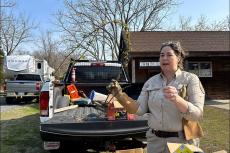A mosquito sample from East Hampton Town was one of 26 new samples to test positive for the West Nile virus in Suffolk County, the County Health Department announced on Aug. 19.
A few days before the positive test was reported for East Hampton, the department reported four new human cases of the virus, bringing the total for the county to five so far this year.
West Nile virus is transmitted to humans through the bite of an infected mosquito. As of Aug. 19, 157 mosquitoes in the county have tested positive for the virus so far this year.
No human cases have yet been reported in East Hampton, as the positive tests have come from the Towns of Brookhaven, Islip, and Babylon. Last year, Suffolk County had five reported human cases of the virus.
“I can say that it can go from mild to severe, and there’s probably a lot of mild cases that people don’t know about,” said Dr. George Dempsey, the medical director at East Hampton Family Medicine.
Symptoms for West Nile virus can vary. Mild symptoms include fever, headache and body aches, skin rash, and swollen lymph glands, while more severe symptoms include high fever, neck stiffness, stupor, disorientation, coma, tremors, convulsions, muscle weakness, vision loss, numbness, and paralysis. Additionally, neurological effects can be permanent and the virus can be fatal.
“It’s called neurotropic” — meaning that the virus attacks brain tissue — “so it can cause long-term effects,” said Dr. Dempsey. “The consequences can be this long-term degeneration of nervous tissue,” he added later. The illness is part of a class of viruses that affect the nervous system.
“Most people infected with West Nile virus will experience mild or no symptoms,” the Health Department said in a press release. Still, 20 percent of people infected develop “clinically noticeable symptoms,” experts estimate.
People over 50 years old and those with compromised immune systems should seek medical attention promptly should they experience any symptoms.
Suffolk County urges residents to take precautions against the virus, including using insect repellents, avoiding the outdoors at night when mosquitoes are most active, wearing long sleeves and long pants at night, and eliminating standing water from gutters, trash bins, bird baths, and swimming pools. However, there is no specific treatment, Dr. Dempsey added.
“Though we have reported large numbers of positive mosquitoes early this season, the recent heavy rain may be enough to disrupt the cycle, as the heavy rain would have washed many mosquitoes and their larvae away,” Scott Campbell, chief of Suffolk County’s Arthropod-Borne Disease Laboratory, said in a press release.
The county’s Department of Public Works Division of Vector Control planned to aerially spray three local marshes with pesticides to control mosquito larvae between Aug. 21 and last Friday.
In East Hampton, the county planned to spray marshes at Cedar Point County Park, Napeague, and Beach Hampton in Amagansett. The chemicals used “have no significant human toxicity,” the Public Works Department stated.
West Nile virus was first reported in Suffolk County in 2001. In 2022, the county reported 11 cases, while last year it reported five cases.
“I think about it when people have these symptoms, and they think it’s chronic Lyme or something, but the tests are negative. That’s when I check for that,” Dr. Dempsey said, referring to West Nile virus. It has been some time since he has seen a positive test, he added, despite checking from “time to time.”
Two crows in Suffolk County tested positive for the virus, one from Hampton Bays and the other from Cutchogue. Five birds total have tested positive for the virus so far this year. Dead birds can indicate the presence of the virus in an area. Dead birds can be reported to the Suffolk County Bureau of Public Health Protection at 631-852-5999 from Monday to Friday between 9 a.m. and 4 p.m.




